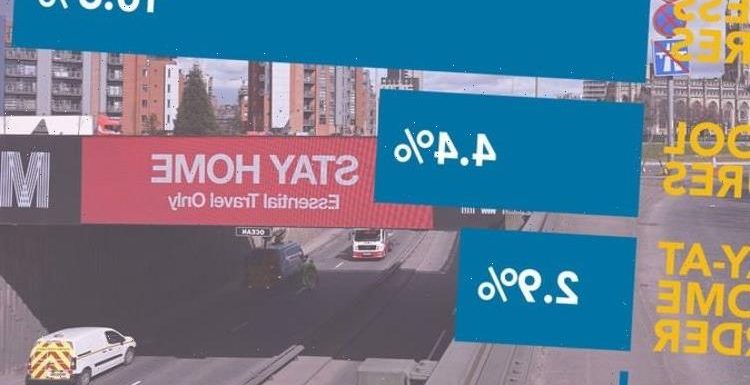
WHO: We are seeing an increase in Covid deaths
We use your sign-up to provide content in ways you’ve consented to and to improve our understanding of you. This may include adverts from us and 3rd parties based on our understanding. You can unsubscribe at any time. More info
The bumper study, undertaken by Johns Hopkins University’s Studies in Applied Economics, is sending shockwaves around the globe as it claims the sacrifices people made during the coronavirus pandemic barely helped save lives. The paper, titled ‘A Literature Review and Meta-Analysis of the Effects of Lockdowns on COVID-19 Mortality’ concludes that “no broad-based evidence of noticeable effects on COVID-19 mortality” is evident.
They found that lockdowns overall prevented just 0.2 percent of Covid deaths on average.
Key lockdown measures looked at in the study included stay at home orders, school closures, business closures, and border closures.
Of these, business closures proved the most useful in preventing 10.6 percent of deaths, followed by school closures on 4.4 percent.
Stay at home orders were next in, preventing 2.9 percent of deaths.
Border closures are proven to have prevented just 0.1 percent of deaths.


The study states: “While this meta-analysis concludes that lockdowns have had little to no public health effects, they have imposed enormous economic and social costs where they have been adopted.
“In consequence, lockdown policies are ill-founded and should be rejected as a pandemic policy instrument.”
The report offers a number of possibilities as to why lockdowns were so unsuccessful.
One possibility is that, with more people isolating at home, higher viral loads were being passed to family members, leading to more severe illness.
Another is that closing certain retail and leisure options lead to a higher concentration of people in one space.

The researchers wrote: “Lockdowns have limited peoples’ access to safe (outdoor) places such as beaches, parks, and zoos, or included outdoor mask mandates or strict outdoor gathering restrictions, pushing people to meet at less safe (indoor) places.
“Indeed, we do find some evidence that limiting gatherings was counterproductive and increased COVID-19 mortality.”
Another theory is that people’s behaviour rebounded so greatly after the restrictions that it rendered any benefits redundant.
The report did, however, find some evidence that closing non-essential businesses — in particular bars — helped reduce deaths.
It said: “Closing nonessential businesses seems to have had some effect (reducing COVID-19 mortality by 10.6 percent), which is likely to be related to the closure of bars.”
DON’T MISS:
Chart exposes biggest factor in cost of living crunch ‒ not energy! [DATA]
Tories out, Labour in! Public fury at Boris Johnson unleashed in poll [POLLS]
Russia-Ukraine crisis mapped: How forces are lining up as war imminent [MAP]
They claimed the best explanation for differing Covid death rates in countries was “differences in population age and health” and the “quality of the health sector”.
They didn’t rule out, however, less obvious factors, such as “culture, communication, and coincidences”.
Covid deaths are also skewed by the volume of testing each country carries out, which many scientists have highlighted as the driving factor behind Britain’s large toll.
It should be noted the report has not yet been peer-reviewed.
The study group originally identified 18,590 global studies into lockdowns, which they claim had to be whittled down to 34 to answer their research question.
The researchers only included studies that looked at the relationship between lockdown policies and Covid mortality or excess mortality, and didn’t include studies that looked at cases or hospitalisations as measures of success.

Critics have, however, accused the researchers of ‘cherry-picking’ studies to suit their narrative.
Doubts about the biases of its authors have also been raised, who have been vocal about lockdowns and vaccine mandates on social media.
Despite this, the latest study will come as a slap in the face for millions who sacrificed so much during the pandemic.
Early on, many states and 186 countries imposed bans on work, socialisation, in-person schooling, travel and other restrictions to limit the spread of the disease, citing recommendations by top healthcare experts.
Researchers at the Imperial College London, for example, predicted that such steps could reduce death rates by up to 98 percent.
But with the UK passing the grim milestone of being the first country in Europe to surpass 150,000 Covid deaths in early January, it’s clear that statistic did not manifest.
Source: Read Full Article